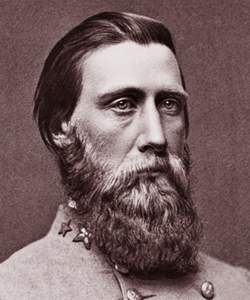John Bell Hood (American National Biography)
Scholarship
[John Bell] Hood was one of the most outstanding brigade and division commanders of the Civil War, but he seemed unfitted for the demands of higher command…He was aggressive but rash in combat. The historian Richard McMurry wrote, "As a fighter, Hood's luck never failed. As a general, he was one of the most unfortunate men ever to head an army" (McMurry, p. 24).
On 7 May [1862] Hood led his men in their first action, an attack on a Union force that had come ashore from boats on the Pamunkey River at Eltham's Landing. The brigade drove the enemy back to the protection of their gunboats, and Hood received praise from Davis and Johnston. In the battle of Gaines' Mill on 27 June, Hood's heroic leadership in attacking the Union position broke the enemy line and won the engagement for the Confederate army.
As the army continued to retreat toward Atlanta, Davis despaired of Johnston's ability to prevent the capture of that vital city. On 17 July he removed Johnston from command and named Hood as his successor, with the temporary rank of full general. The new commander quickly went on the offensive. His troops attacked the armies of Major General William Tecumseh Sherman in the battles of Peachtree Creek (20 July), Atlanta (22 July), and Ezra Church (28 July). All three engagements ended in defeats for the Confederates.
On 7 May [1862] Hood led his men in their first action, an attack on a Union force that had come ashore from boats on the Pamunkey River at Eltham's Landing. The brigade drove the enemy back to the protection of their gunboats, and Hood received praise from Davis and Johnston. In the battle of Gaines' Mill on 27 June, Hood's heroic leadership in attacking the Union position broke the enemy line and won the engagement for the Confederate army.
As the army continued to retreat toward Atlanta, Davis despaired of Johnston's ability to prevent the capture of that vital city. On 17 July he removed Johnston from command and named Hood as his successor, with the temporary rank of full general. The new commander quickly went on the offensive. His troops attacked the armies of Major General William Tecumseh Sherman in the battles of Peachtree Creek (20 July), Atlanta (22 July), and Ezra Church (28 July). All three engagements ended in defeats for the Confederates.
Arthur W. Bergeron, “Hood, John Bell,” American National Biography Online, February 2000, http://www.anb.org/articles/04/04-01177.html.




